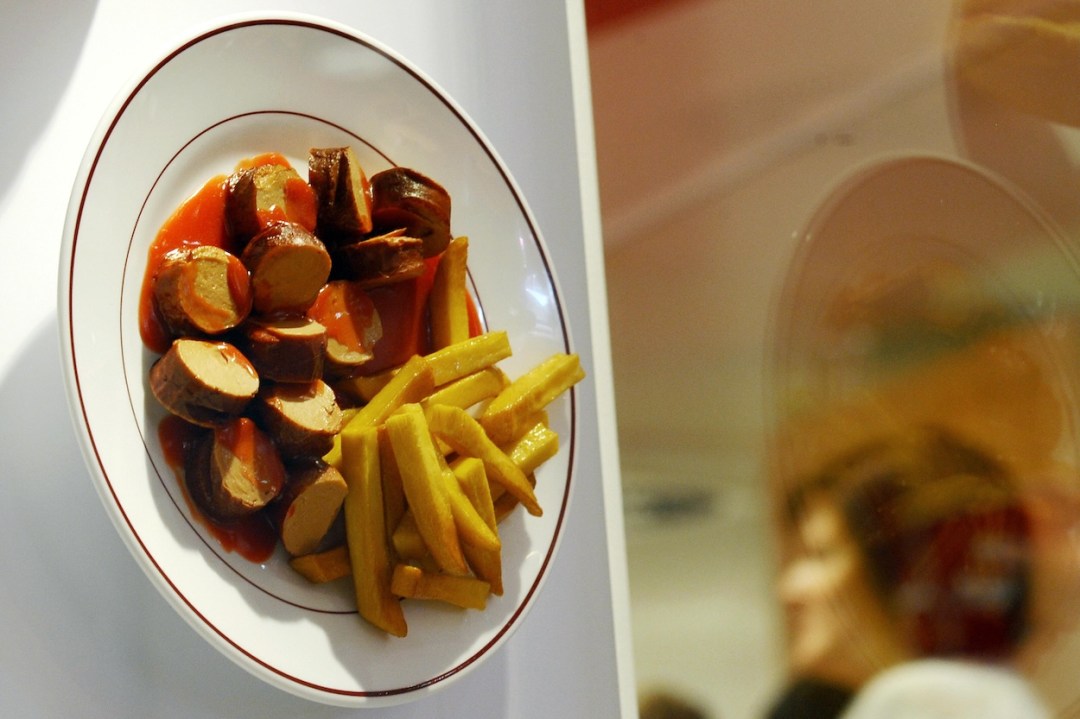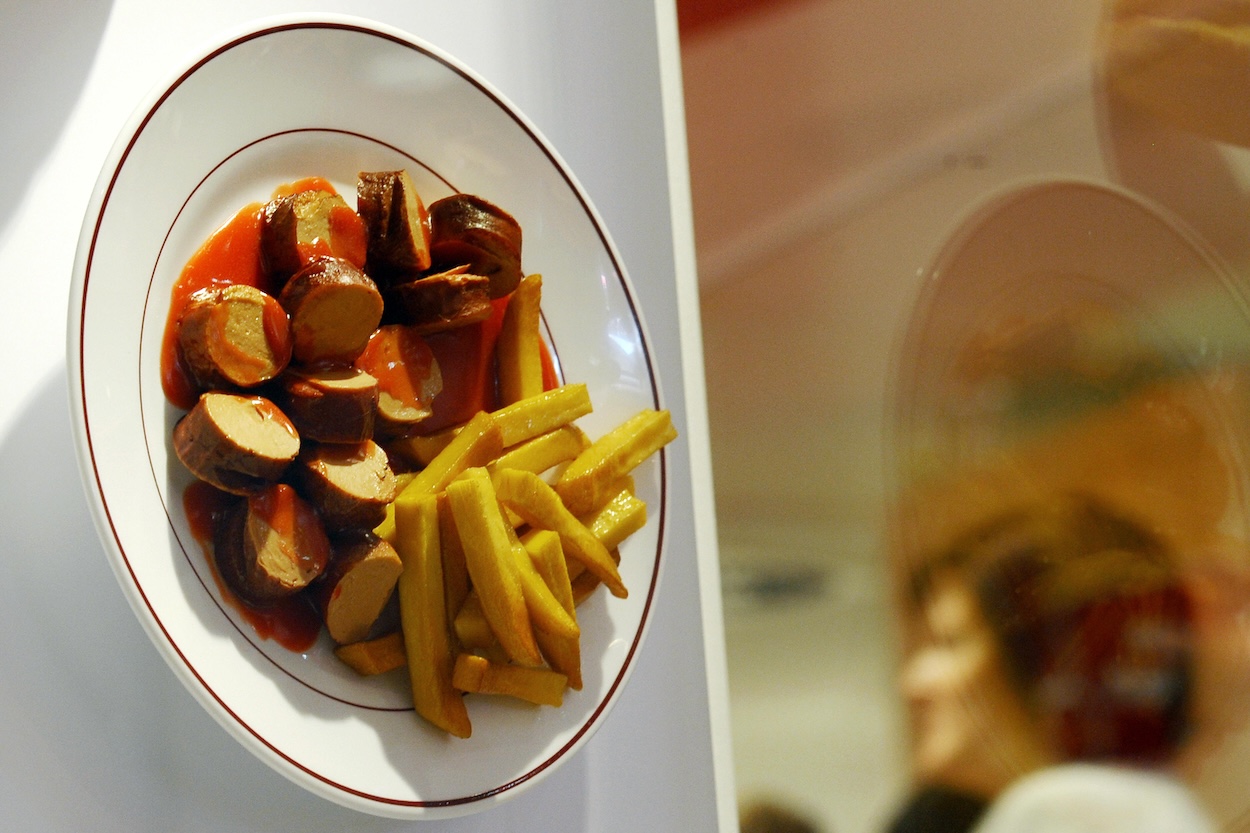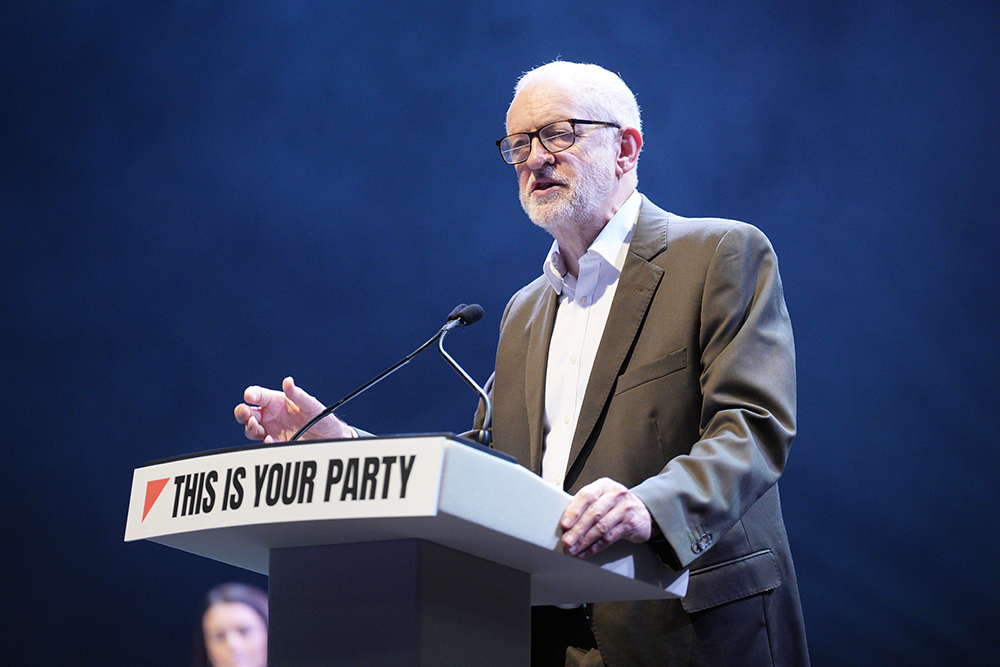I’m standing at a bar in a car park on the rooftop of a shopping centre. I ask the bartender if the beer on draught is big or small. ‘That depends on your definition,’ he says. ‘What is big? What is small?’ The oonce-oonce of German trance music makes it hard to hear, and I’m distracted by the solitary figure on the dance floor wearing all black and contorting her body into the shape of a pretzel. ‘Is the beer groß or klein?’ I shout. The bartender – who is well over 50 and has the fashion sense of a Green Day groupie from 2005 – just smirks and says, ‘That’s for you to decide.’ I order the beer anyway. It is small (klein). I don’t tip.
This is Berlin. Berlin is big. (I don’t care what our analytic philosopher-turned-bartender thinks about the relative concept of big and small; we’ve all pretended to read Wittgenstein to get laid – just pour the damn beer and keep the pontificating to yourself.) Berlin is big geographically. It is big culturally. It is big historically. And it occupies a ‘big’ place in my heart.
I was bitten by the Berlin bug at 17. It was a school history trip. And although the trip was designed to further my academic education, it was really one of those coming-of-age journeys – or, as the Germans call it, a Bildungsroman. We stayed for four nights at a dingy hostel on the lip of the old eastern border, near Friedrichstraße, only a stone’s throw from Alexanderplatz and the imperious Television Tower that dominates Berlin’s nighttime skyline like a manmade Polaris.
I don’t remember sleeping on that trip, and that’s because we didn’t. But I remember everything else. I remember standing by the World Clock as the cold air turned my teacher’s face into necrotic crust. I remember accidentally blocking a McDonald’s doorway in Potsdam and being thrown to the ground by an impatient German bloke who didn’t find my yapping amusing. I remember drinking one million steins of beer at the kitschy Hofbräu, and I remember the live band clad in lederhosen singing a German version of John Denver’s ‘Take Me Home, Country Roads’. I remember having the same awful Bavarian meal at the same awful Bavarian restaurant every night – meat, cabbage and potato – and I remember longing for something green on my plate. I remember standing on the banks of the River Spree and thinking that no city is quite as ugly and quite as beautiful as Berlin. I remember smoking enough Lucky Strikes to kill Don Draper, and I remember doing so indoors at bars where it was permitted. I remember the Stasi prison where the googly-eyed tour guide dragged my friend into one of the cells and performed a KGB-style interrogation far too convincingly: ‘Keep laughing, little piss boy, but you won’t be laughing when I glue your mouth shut!’ I remember the German biker gang with their ZZ Top beards and their songs about tanks and sex. I remember currywurst, shivering, and tobacco vending machines. I remember black leather jackets, sex clubs, the U-Bahn at 3 a.m., and long, wide roads where the homeless sit quiet and defeated.
And I remember the history, too. Berlin is a scarred city. And it wears its scars – not proudly, of course, but with admission. Every street is a reminder of what happened before. Every monument, plaque and tattered old building is an aide-mémoire to the horrors that occurred there. A matcha latte coffee shop opposite Bebelplatz, where the Nazis burnt 20,000 books. In the ground there is The Empty Library and an inlaid plaque with the prophetic epitaph from Heinrich Heine’s 1820 play Almansor: ‘That was only a prelude; where they burn books, they will in the end also burn people.’ A Just Eat driver smoking a cigarette under the arches of a Yorckstraße bridge, the bullet holes from the Battle of Berlin like pockmarks in the iron. A mime performing a silly routine just a few hundred yards from the Reichstag, where Hitler delivered his ‘annihilation of the Jewish race’ speech to the German public. The sharp colour gradient between the orange-yellow sodium-vapour lamps of the East and their harsh white LED counterparts in the West – a reminder that Berlin was divided until 35 years ago. The brutal Reichsbahnbunker Friedrichstraße, which now houses the Boros Collection of contemporary art but once served as a Nazi air-raid shelter and subsequently a Red Army prisoner-of-war camp. The sleek, modernist skyscraper known as ‘Upper West’ and the way it glares down upon the bruised and battered skeletal remains of the Kaiser Wilhelm Memorial Church on Breitscheidplatz.
It’s a Marmite city. You either get it or you don’t. And I don’t judge you for not getting it
I came back from Berlin with a voice like Tom Waits (on account of the cigarettes), scurvy (on account of the meat-centric diet) and a newfound appreciation for the German capital. Berlin is a strange place. It’s a Marmite city. You either get it or you don’t. And I don’t judge you for not getting it.
This summer, my girlfriend suggested we join her best friend and her best friend’s partner in Berlin for a couples holiday. It had been seven years since I’d visited the Grey City, and I was quick to say yes. I decided that I should make an itinerary. I wanted my travel buddies to see the places I had seen and do the things that I had done. The sprawling grounds of Sanssouci Park. The Cold War bunker tour where the guides say things like: ‘Having a nuclear bomb dropped on your head would not be super chill, guys. Let me tell you, that’s a bad way to start your Monday.’ The memorials to the murdered Jews of Europe and the Sinti and Roma victims of National Socialism. The dimly lit dive bars in the now uber-trendy districts of Kreuzberg and Neukölln, where mystery vending machines sell ‘secret packs’ of unclaimed Amazon items for €10 a pop. The DDR museum, where you can pretend to be a depressed 1970s East Berliner for the day – spoiler: the food was foul back then (though it’s not much better now).
I think the group enjoyed my schedule, but no one enjoyed it as much as me. That’s my problem with Berlin: I like it too much. And truthfully, I don’t know why. It’s cold. It’s grey. It’s bleak. It smells. The food is mediocre. I know Berlin is not the greatest city on earth; it’s not even the greatest city in Europe. There are far ‘nicer’ cities to visit: Verona, Barcelona, Lisbon, Florence, Seville. But there’s something about Berlin that draws me back, something ineffable. This is not to say that I would make Berlin my home, but I’ve got an undeniable soft spot for the German metropolis. Maybe it’s the way the city makes me feel anonymous. Maybe it’s the currywurst. (I doubt it.) In any case, I won’t leave it another seven years before I return; to steal and paraphrase a line from Marlene Dietrich’s ‘Ich hab’ noch einen Koffer in Berlin’, I will always keep a suitcase in Berlin.








Comments